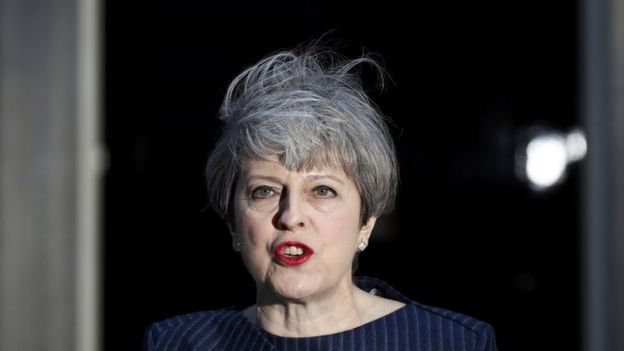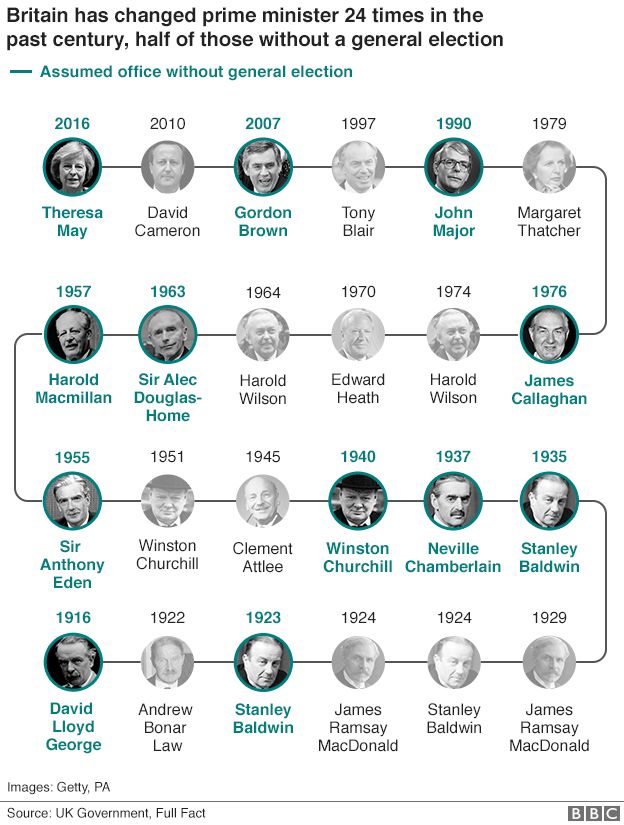General election: MPs ready to approve snap poll on 8 June
Theresa May’s plan for a snap general election on 8 June is set to be authorised by MPs later.
The early poll is expected to secure the two-thirds Commons majority it requires to go ahead, with Labour’s Jeremy Corbyn welcoming the PM’s surprise announcement on Tuesday.
Mrs May said that she wanted to secure the backing of the British people for her Brexit negotiations.
She told the Sun newspaper “political game playing” risked hampering talks.
The next general election had been expected in 2020, but the Fixed Term Parliaments Act allows for one to be held earlier if two-thirds of MPs back the move.
A motion to this effect will be put before the Commons on Wednesday afternoon.
The SNP has signalled its MPs will abstain in the vote, but Labour and the Liberal Democrats have welcomed the early election.
- General election: What you need to know
- Labour MPs will not require re-selection
- May ‘won’t take part in TV debates’
- Reality Check: How do you call an early election?
Opposition parties have highlighted Mrs May’s U-turn after she had previously insisted she would not be calling an early poll, but Mr Corbyn said it was a chance to get a government that puts “the majority first”.
Opponents also accused Mrs May of ducking out of TV debates during the campaign, after a Downing Street source said she would not be taking part.
Analysis
 Image copyright Reuters
Image copyright Reuters By BBC political editor Laura Kuenssberg
Senior government sources point to a specific factor that changed the prime minister’s calculation on an early election.
The end of the likely tortuous Article 50 negotiations is a hard deadline set for March 2019.
Under the Fixed Term Parliaments Act, that’s when the Tories would be starting to prepare for a general election the following year, with what one cabinet minister described as certain “political needs”.
In other words, the government would be exposed to hardball from the EU because ministers would be desperate to avoid accepting anything that would be politically unpopular, or hold the Brexit process up, at the start of a crucial election cycle.
Ministers say that’s the central reason for Mrs May’s change of heart because “if there was an election in three years, we’d be up against the clock”.
Read Laura’s latest blog in full
In her interview with the Sun on Wednesday, Mrs May said “political game playing” risked hampering her Brexit negotiations, with some opponents “trying to stop us every step of the way”.
Explaining her U-turn, she said she had had a “real opportunity to think this through” during a walking holiday in Wales with her husband over Easter.
“What I hope comes out of the election is support from the public to say we agree with their plan for Brexit, so that when I go into Europe I’ve got that backing of the British people,” she added.
- Election 2017: Parliamentary timeline
- Do snap elections mean bigger majorities?
- After the shock: How the day unfolded
- Will it help Tories move on from expenses row?
The PM also said the timing of a 2020 general election could hamper Brexit talks.
She added: “If we’re negotiating at a point that is quite close to a general election, I think the Europeans might have seen that as a time of weakness when they could push us.
“Now we will be much freer.”
World leaders
Speaking on BBC Newsnight, Home Secretary Amber Rudd said securing a stronger majority would give the PM “the opportunity to arrive at potential compromises within the EU”.
Ms Rudd and Foreign Secretary Boris Johnson were told about the election announcement prior to Mrs May’s cabinet meeting on Tuesday.
Brexit Secretary David Davis and Chancellor Philip Hammond are believed to have been the only ministers who were extensively consulted.
BBC political editor Laura Kuenssberg said there were ministers around the cabinet table who had had no idea and were visibly shocked when Mrs May told them.
On Tuesday evening, Mrs May made a series of courtesy calls to world leaders, including German Chancellor Angela Merkel and US President Donald Trump, who wished “the British people the best of luck in their electoral process”.

After Mr Corbyn had addressed Labour MPs on Tuesday evening, a source close to the leader said the party was in for “the fight of our lives” but there was a “very positive mood” among his colleagues.
The source said Labour “was ready to fight it”, but criticised the prime minister for what he called “her deceit of the country over calling the election”.
BBC political correspondent Chris Mason said the leader had told his MPs: “I don’t underestimate how much there is to do, we’ve got six weeks to do it, let’s get out there and do just that.”
‘Selfish interests’
However, one of Mr Corbyn’s critics, Labour backbencher John Woodcock, said there was still time for the leader to quit ahead of the poll, “rather than lead Labour to defeat”.
Scotland’s First Minister Nicola Sturgeon said she would be fighting the election “to win”, saying the PM had called it “for selfish, narrow, party political interests”.
Lib Dem leader Tim Farron pledged to fight for the UK to stay in the EU single market, and accused Mrs May of “bottling” taking part in TV debates.
- For full 2015 results see our interactive map or A-Z constituency postcode search.
- BBC NEWS





